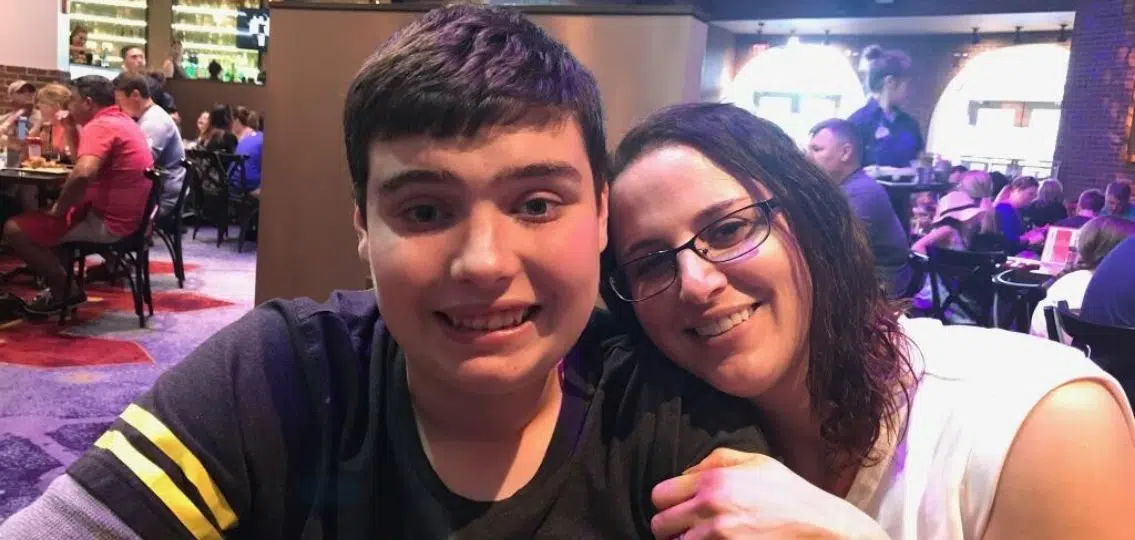“Hi, how are you?” seems like an innocuous question, more of a general greeting than an inquiry. It’s usually acceptable to answer, “Fine, thank you,” especially if you’re speaking with someone you don’t know well, like your dry cleaner or a grocery store clerk. But when a true friend or family member asks, it’s probably more probing—more like, “How are you actually doing?” Still, I often give the same offhanded answer to these friends and family, too, or I’ll avoid answering entirely by lobbing the question back at them.
Most people don’t notice what I’m doing. Most people don’t realize I’m not being honest, that sometimes I think, I’m drowning, I’m overwhelmed, I’m exhausted, I don’t know if I can do this anymore. That truth is hard to face. Hard to say. Hard to hear. So, most times, I don’t share that I live under very stressful circumstances.
My severely autistic son lives at home with me. He’s smart. He’s funny. He’s beyond sweet. He’s loving and affectionate—I get more kisses than any other Mama. My son is also anxious, has a low threshold for frustration, harms himself by biting his arms, is sometimes aggressive towards me by grabbing and trying to bite me, and he needs a lot of supervision and care.
I wouldn’t trade him for the world, but my son’s disability makes my life very challenging.
The Struggles Of Parenting Children with Autism
I need to help him with showers, brushing teeth, flossing, clipping nails, cleaning ears, shaving, and matching clothes. Four times a day, I dole out his medications carefully. Suffice it to say, I’m responsible for a lot of caregiving duties that end, for most people, when their children become teenagers. My son is twenty years old.
To cope, I try hard to concentrate on the positive. I take stock of the blessings in my life. I have faith. I have a wonderful husband and he has a good job that pays well enough for me to stay at home and give my son the care and attention he needs. Most days, my son attends a charter school specifically for autism. It’s a wonderful school that gives him many opportunities to grow and learn. He’s completely safe and accepted there, loved even. I don’t have to worry about him as much when he’s there. I also have a beautiful daughter who’s loving and smart. She just left for college.
My family’s not rich, but we’ve never struggled to eat, and we have a place to live year-round in a safe area of sunny, beautiful South Florida, where people love to vacation. I also have friends that are dear to me and family not too far away.
All these people care about me, and yet, I struggle with how much to tell them.
Some days, I’m too tired to express what I’m feeling or what’s currently happening in our lives. Some days, I don’t want to bring others down or put them in an awkward position. Sometimes their reactions, though well intended, make me feel worse. “I don’t know how you do it!” is not comforting or helpful. It sounds like pity. The well-meaning, “Have you tried…?” God, yes, we’ve tried it all. There are no easy answers here. Sometimes our life is what it is. I’m not looking for anyone (anyone who is a nonprofessional) to fix it.
What I want to say is, “Friends, I know you mean well, but you don’t know what you’re talking about. You just don’t.” But that sounds too harsh, so instead I soldier on, and for a variety of reasons, I rarely let on how hard it is to have a son with a severe disability. Sometimes (most times) I just want to talk about something else.
If you want a suggestion for what to say to a parent of an autistic child in this situation, a simple “I’m sorry that it’s so hard” will suffice. Listen without judgment or advice, and just be there for your family member or friend. A funny story or distraction is always welcome, too.




